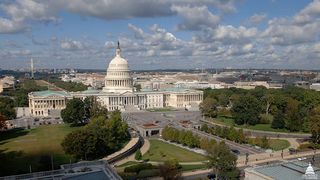Computer Cos. to Hill: We're Part of Sex Trafficking Solution

The members of the Internet Association, which bills itself as the "unified voice of the internet economy," is apparently pretty unified against the Stop Enabling Sex Traffickers Act of 2017 (SESTA), saying it could lead to less monitoring of sex trafficking, embolden foreign powers looking to suppress speech, and have unintended consequences that could affect social media sites like Twitter and Facebook.
That is according to the testimony of association general counsel Abigail Slater for a Senate Commerce Committee hearing on the bill Tuesday, Sept. 19, a bill that was prompted in part by an investigation of backpage.com.
The association's 40-plus members include Amazon, Facebook, Google, Twitter and Netflix.
Not surprisingly, Slater takes pains to point out that IA's members think sex trafficking is a "horrific" crime that must be stopped, and those perpetrating it held accountable.
IA also said it supports targeted changes to the Communications Decency Act to allow victims of sex trafficking to seek legal recourse. For example, an amendment that allows civil suits against online actors with demonstrated "knowledge and intent" to facilitate sex trafficking.
The association said its members are already key and "committed" actors in the fight against sex trafficking.
"The internet industry stands ready to work with you on legislative approaches that ensure justice and contribute to the fight against trafficking," she said.
But, as well intentioned as SESA might be, she said, it would make IA's member companies "liable for all their ongoing work with law enforcement." The bill will harm good actors, she said, while undermining the goal of combatting trafficking.
She said the bill, as written, does not require knowledge of the illegal activity or a means to stop it for a site's protection from liability to be eliminated. The bill does require "knowing conduct," but she said that is not a legally defined term and could be interpreted as the fact that a platform knows its users communicate, which would encompass all social media sites. The term "facilitate" is also extremely broad, she said.
Slater siad that not only would the bill create new legal risks for websites, it would also create contributory liability risks for a host of innocent businesses.
And allowing for civil liability will result in "playing whack-a-mole with URLs/domains in courts, which is unlikely to stop bad actors, who can simply move overseas or change their URLs.
Removing civil liability protections will create a disincentive for providers to look for evidence of trafficking since it could implicate them in civil and criminal causes of action.
She also told the Senators the bill would "send a dangerous signal to other countries that are seeking to require U.S. internet services to filter dissenting political speech and allegations of corruption."
Broadcasting & Cable Newsletter
The smarter way to stay on top of broadcasting and cable industry. Sign up below
Contributing editor John Eggerton has been an editor and/or writer on media regulation, legislation and policy for over four decades, including covering the FCC, FTC, Congress, the major media trade associations, and the federal courts. In addition to Multichannel News and Broadcasting + Cable, his work has appeared in Radio World, TV Technology, TV Fax, This Week in Consumer Electronics, Variety and the Encyclopedia Britannica.

